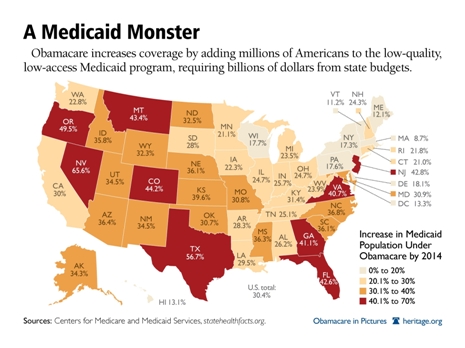The Constitutionality of Obama's mandate: Reading the Constitution (2 of 8): "
In our last installment (Blog 1) of this 8 part series examining the constitutionality of the health care mandate, we stated that the "individual mandate" included in the Democrats' health care reform bill is:
...a command by the federal government that nearly every United States citizen obtain acceptable health insurance as defined by the government or be subject to a financial penalty. Put even more simply, the government will force individuals to purchase a government approved product—health insurance—not as a consequence of any of their actions but merely because they exist.
Now that we have that defined it as such, we can begin our discussion of whether or not the mandate is constitutional. But before we can determine if Congress has the constitutional authority to enact a law, we must know how the Constitution and the limitations that it holds on government should be read. Only by understanding how to view the document can we grasp the powers that it grants and the powers that it prohibits.
Section 2: How should we view the Constitution?
Before the health care legislation became law, I had the honor of meeting Clarence Thomas, Associate Justice of the United States Supreme Court. During the meeting, Justice Thomas explained his belief that the first question that one must ask when examining any law or restriction is, "By what authority?" To clarify his point, Thomas used the following example: If a police officer were to come down from Anchorage, Alaska and try to arrest an individual who was guilty of no crime in Worcester, Massachusetts, the first question that that individual would ask is, "By what authority are you arresting me?" Similarly, Justice Thomas insists, when considering legislation passed by the federal government, one must ask, "By what authority is the government enacting this law?" Justice Thomas’s question raises an even greater one. By what authority does the government enact any law?
The federal government receives the authority to make laws from the United States Constitution. The Constitution, however, also limits government’s authority. Only certain types of laws can be passed by the federal government. Depending upon how the Constitution is read, the extent of such restrictions may vary. So how should we view the Constitution? Today, there are two prevailing views. One, as we will see, protects the individual liberties of every American while preserving the authority it grants to the federal government and the other threatens the security of both.
On one side of this crucial argument are those who favor “judicial activism.” Proponents of judicial activism assert that the Constitution is a “living document” and that it must be able to adapt to modern circumstances. The founders, they assert, could not have possibly envisioned the circumstances that face modern Americans. Thus, it is the job of those in the Federal Court System to apply modern interpretations to the document. Providing the Court with the freedom to expand upon the document allows it to address circumstances that the writers could not have foreseen. The Court must not be bound by a strict reading of the text.
On the other side of the debate are so-called “originalists.” Originalists believe that the meaning of the Constitution is finite and knowable. They believe that the meaning was set at the time of the founding and that it must not be expanded upon. Expanding upon the founders’ original intent, they argue, can only lead to violations of the very freedoms that the Constitution was written to protect.
In his book, Restoring the Lost Constitution, Randy E. Barnett argues that proponents of judicial activism expand upon the framers’ original intent because the Constitution is seen as an obstacle standing in the way of “noble objectives.” In order to abide by the Constitution, one must be willing to accept that the power of the federal government is limited. One must understand that the federal government was instituted to protect the rights of individuals and nothing more. If this premise is accepted, then it does not matter how many citizens a given piece of legislation may help. All that matters is whether or not the government possesses the constitutional authority to pass such legislation. This is problematic for many who see the Constitution as a barrier standing between government and its ability to achieve “progress.” Barnett writes:
One way to slip [the bonds set on government by the Constitution] is to imply that the original Constitution is illegitimate by repeating the refrain that we cannot be bound by the “dead hand of the past” or by constantly invoking the various sins of the framers. By delegitimizing the original Constitution, such rhetoric seeks to free us from its constraints.
In order to decide whether or not such constraints are problematic and to understand what constitutional limitations mean for the individual mandate, we must identify the original purpose of the Constitution. Why was it written?
To answer this question, it is essential to first examine the views of the men who wrote the document. The Constitution was adopted on September 17, 1787. In the years that led to its ratification, America broke away from oppressive tyrannical rule, declared its independence, experimented with a flawed confederation and hosted a lengthy public debate concerning how best to reform the nation’s government. Each of these major events greatly impacted the writing of the American Constitution and—at their core—each of them was a defense of individual liberty. In Restoring the Lost Constitution, Barnett asserts that:
[In] the founders’ view… ‘first comes rights, and then comes the Constitution.’
This becomes evident when examining the document used to declare America’s separation from the British Empire.
The preamble to the Declaration of Independence states:
We hold these truths to be self-evident, that all men are created equal, that they are endowed by their Creator with certain unalienable Rights, that among these are Life, Liberty and the pursuit of Happiness. That to secure these rights, Governments are instituted among Men, deriving their just powers from the consent of the governed, That whenever any Form of Government becomes destructive of these ends, it is the Right of the People to alter or to abolish it, and to institute new Government …
The arrangement of this statement reveals the founders’ belief that natural rights pre-exist the establishment of a government. The Declaration begins, “We hold these truths to be self-evident…” By referring to the aspects of the subsequent statement as self-evident truths, the founders insist that they do not merely apply to colonists but rather that they are universal. Included in these universal truths is the idea, “that all men are created equal, that they are endowed by their Creator with certain unalienable Rights, that among these are Life, Liberty and the pursuit of Happiness.” This bold assertion reveals the founders’ dedication to the notion that no one life is more valuable than the next, and that—by virtue of sharing the same rights—no individual or group of individuals has the authority to rule over or oppress another. Moreover, the equal rights shared by all humans are “unalienable.” They cannot be taken away. This is because they are granted not by any man or institution but rather they are “endowed” upon individuals by their Creator. Only the One who grants rights has the authority to take them away.
Although the founders believed in the unalienable rights of every person, they also understood that there will always be forces in this world that seek to oppress. Thus, “to secure these rights, Governments are instituted among Men, deriving their just powers from the consent of the governed, That whenever any Form of Government becomes destructive of these ends, it is the Right of the People to alter or to abolish it.” In the eyes of the founders, government does not possess rights. Its sole purpose is to protect the rights of its citizenry from outside forces. If it fails in this duty, it is the responsibility of individuals to abolish it. The writers of the Declaration—and subsequently the writers of the Constitution—believed that government’s power comes out of its ability to protect the rights of its people. Individuals do not receive natural rights from government and thus government does not have the authority to take rights away. To the extent that it protects individual rights, government operates legitimately. When it fails to protect such rights, government becomes an unlawful ruler over what would otherwise be free people.
In Common Sense, the 1776 pamphlet which served as the spark that lit the powder keg of the revolution, Thomas Paine captured the founders’ views on government:
[G]overnment even in its best state is but a necessary evil; in its worst state an intolerable one.
The founders knew that government is needed to protect the natural rights of individuals. But—after fighting to escape the wrath of British rule—they were well aware of its propensity for power. To insure that American citizens would be free from the shackles of government, they wrote the United States Constitution. The checks and limitations that were incorporated within it were seen as both a safeguard against oppression and an essential way of protecting personal liberty.
The Declaration of Independence makes clear that the purpose for writing the Constitution was twofold. It was written to grant the federal government the authority to impose upon specific liberties in order to protect the natural rights of citizens; it was also written to protect the rights of citizens from both the overreaching hand of government and outside oppressors.
Since it is impossible for an individual to gain more natural rights than were granted to him by his Creator and since government cannot gain more power without imposing upon the rights of individuals—which, in doing so, renders it illegitimate—the Constitution cannot be read loosely. An expansion upon the original meaning of the Constitution grants Congress illegitimate power and infringes upon the liberties that it was written to protect. Thus, when viewing the Constitution one must adhere to a strict textual reading. Without such a reading, government has no authority to pass laws, and individuals lose an essential safeguard against oppression.
In our next installment of this series of 8 blogs, we will examine which section of the Constitution--if any-- allows the federal government to mandate the purchase of health insurance.
"






